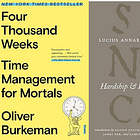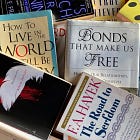Making a Start to a Better Life
“On Anger” will help you identify and overcome the excuses and justifications you may use for your angry feelings.
Anger—a point I stress—has this particular evil trait: it’s unwilling to be controlled. It grows angry at the truth itself, if it appears to contradict its will. It pursues its intended victims with shouting and uproar, the whole body shaking, with abuse and curses added in.—Seneca
Our Mindset Shifts U study of Seneca's "On Anger" kicks off on December 7th.
Three short “books” make up “On Anger.” I originally intended to cover “On Anger” in two sessions but have decided to add a third. Each “book” of “On Anger” is about 25 pages long.
Session 1, Book 1: begins Dec 7th
Session 2, Book 2: begins Dec 14th
Session 3, Book 3: begins Jan 11th
In 2025, our study of Seneca’s “On the Shortness of Life” and Oliver Burkeman’s Four Thousand Weeks will begin on January 25th.
As I prepare for our “On Anger” sessions, I find myself wanting to highlight almost more passages than I can share. Have I grown angrier over the years? I don’t think so. But I strive to be more conscious of anger's subtle attempts to take root in my mind.
You might be undecided about joining our “On Anger” sessions. Here's why studying Seneca will benefit you.
Seneca wants us to know “looking closely first at anger’s ugliness, then at its peril” is a useful “deterrent” to its corrupting effects. Shining a light on what we are up to is the beginning of a cure. We can’t look at our anger from a distance.
Seneca systematically challenges and dismantles our faulty beliefs about anger. He's right there with us, aiding us through our human struggles. His other writings delve into happiness, finding meaning, and achieving tranquility, consistently written in a way that endures through time.
But I’m not an angry person, you might think. Seneca reveals that even a tiny annoyance shares the same root as intense anger. Angry people “deny they’re angry just as madmen deny they’re insane.”
Have you ever sworn at your computer or a gadget in frustration? Seneca writes, “It’s a mark of a lunatic to become angry with objects that lack a soul.”
“On Anger” will help you identify and overcome the excuses and justifications you may use for your angry feelings.
You'll find relief in the understanding that flaws don't make you who you are. Anger, while commonplace, is not your true essence; you are not a “bad seed.”
Like Marcus Aurelius, Seneca reaches across millennia. He reminds us that prosperity breeds entitlement, which in turn causes anger when our expectations are unmet.
The groundbreaking cognitive therapist Albert Ellis was significantly influenced by Stoic thought. We will examine what Ellis says about the human tendency to turn our preferences into commands for others, a habit of mind that he called musturbatory thinking.
Seneca warns that anger’s “slippery slope makes for an easy downhill run.” Anger is something you should avoid letting in. We will explore what to do if you leave your mind’s door ajar.
Anger, Seneca argues, has no upside. You won't be any more effective or motivated.
Seneca offers practical advice, including how to forgive others for their wrongdoings. He'll make you more aware of how destructive revenge can be.
Seneca repeatedly clarifies the purpose of our investigation into anger. By recognizing anger's nature, its many expressions, and its impact, you can choose to act differently.
Don’t delude yourself. He cautions, “No one can at the same time be both angry and a good man.”
It is easy to begin. He instructs, “The way to the best human life is easy: just make a start.”
Here are the first steps to take on your journey with Seneca.
Become a paid subscriber to this Subtack. You'll have unlimited access to all past and future Mindset Shifts U sessions while your subscription continues.
Consider the following book recommendations.
For the upcoming sessions, as I reread “On Anger,” I have been struck by the magnificent work of the University of Chicago translators. Seneca’s wisdom and clear thinking are enhanced by a modern translation that does not distort the original text.
As I write this post, Kindle has an excellent sale on the University of Chicago translation of Seneca’s “On Anger” in their volume Anger, Mercy, Revenge.
The one downside of purchasing Anger, Mercy, Revenge is that it does not include Seneca’s “On the Shortness of Life” (part of our work beginning in January 2025). The University of Chicago translation Hardship and Happiness includes “On the Shortness of Life.” That volume is often on Kindle sale, too.
Inexpensive public domain versions of “On the Shortness of Life” are available, such as this one.
The Oxford collection of Seneca’s Dialogues and Essays contains “On Anger” (Book 3) and “On the Shortness of Life,” as well as other essays. You can fill the gap for Books 1 and 2 of “On Anger” with an inexpensive public domain version or a free online version accessed or downloaded at this site. Again, each “book” of “On Anger” is only about 25 pages.
Wholeheartedly, I am looking forward to sharing Seneca’s wisdom with you.






I'm looking forward to these sessions. For most of my life I have been quick to anger, and it is only in the last couple of years that I've made any progress, limited as it may have been, towards reducing that tendency. I read somewhere that anger is often a psychological defense against feeling one of the more vulnerable emotions like hurt, sadness, or fear, and I've found that to be true in my own experience. When I do still find myself getting angry, if I have the presence of mind to remember to examine whether there's something underneath it that I'm trying not to feel, I usually find that there is, and that tends to turn the volume of the anger down.
...and for a long time, when I heard the word "stoic", the word picture I got was a tree stump.